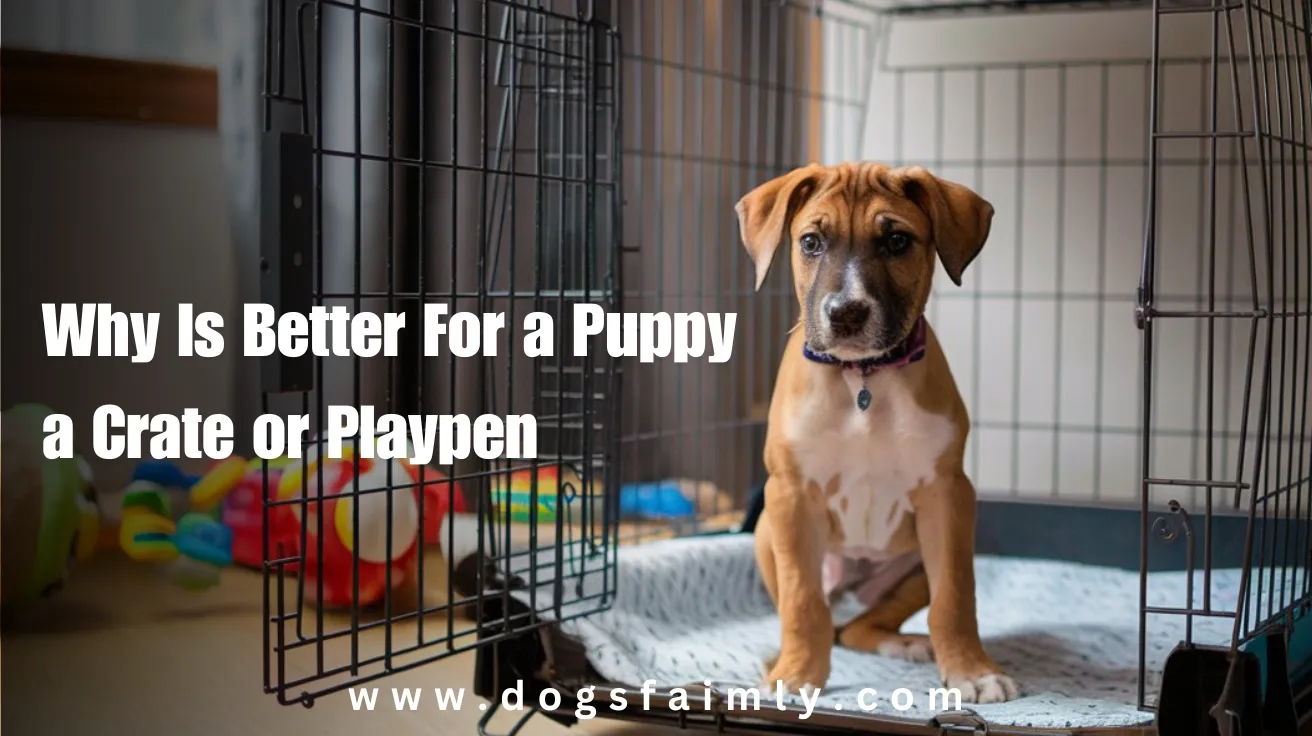Introduction
Why Is Better For a Puppy a Crate or Playpen, Bringing a new puppy into your home is an exciting adventure filled with joy, companionship, and a little chaos. One of the biggest decisions you’ll face is how to create a safe and comfortable space for your new furry friend. Should you invest in a crate or a playpen? Both options have their advantages, but understanding the differences can help you choose what’s best for your puppy. In this article, we’ll explore the benefits and drawbacks of each option to help you make an informed decision.
The Benefits of Using a Crate
1. Provides a Safe Space
A crate serves as a secure environment for your puppy. Dogs are den animals by nature, and they instinctively seek small, enclosed spaces where they feel safe. By introducing your puppy to a crate, you create a cozy sanctuary for them to retreat to when they need some downtime.
Anecdote: When Sarah brought home her puppy, Max, she noticed that he would often run to his crate during noisy moments. It became his little hideaway, helping him feel secure amidst the hustle and bustle of family life.
2. Aids in Potty Training
Crate training is an effective method for housebreaking your puppy. Dogs naturally avoid soiling their sleeping area, so using a crate encourages them to hold their bladder until they can go outside. This makes the potty training process smoother and more efficient.
3. Prevents Destructive Behavior
When left unsupervised, puppies are notorious for chewing on furniture, shoes, and anything else they can find. A crate keeps your puppy safe and prevents destructive behaviors when you can’t keep an eye on them. This is especially useful during the early stages of training.
4. Facilitates Travel
If you plan to travel with your puppy, a crate can be a convenient solution. It provides a familiar space for your dog, reducing anxiety during trips. Many airlines require pets to travel in crates, so getting your puppy used to one early on can ease future travel experiences.
The Benefits of Using a Playpen
1. More Space to Move Around
A playpen offers more space for your puppy to roam and play. While a crate is limited to a small area, a playpen allows your puppy to stretch their legs and engage in play, which is essential for their development.
2. Encourages Playtime and Socialization
With a playpen, you can safely introduce toys and even other pets, encouraging interaction and socialization. This is crucial for your puppy’s emotional growth and helps them learn how to behave around other animals and humans.
3. Easier Supervision
Playpens allow for better supervision while giving your puppy the freedom to explore. You can set up a playpen in the living room or kitchen, making it easy to keep an eye on your puppy while you go about your daily tasks.
4. Flexibility
Playpens can be easily moved and adjusted to fit your space. They can be set up indoors or outdoors, making them versatile for different activities. If you want your puppy to enjoy some fresh air, a playpen is an excellent option.
Comparing Crates and Playpens
Space
- Crate: Limited space; great for short-term confinement and safe sleeping.
- Playpen: Offers ample room for movement, play, and exploration.
Training
- Crate: Excellent for potty training and preventing destructive behaviors.
- Playpen: Useful for socialization and encouraging play, but not ideal for potty training.
Safety
- Crate: Provides a secure environment when you’re not able to supervise.
- Playpen: Safe for short periods, but puppies can sometimes escape or knock it over if not properly secured.
Travel
- Crate: Ideal for travel, as it offers a familiar space and is often required by airlines.
- Playpen: Less practical for travel, but can be set up in various locations.
Which Option Is Right for Your Puppy?
Why Is Better For a Puppy a Crate or Playpen? Choosing between a crate and a playpen depends on your puppy’s personality, your lifestyle, and your training goals. Here are some steps to help you decide:
Step 1: Assess Your Puppy’s Behavior
Observe your puppy’s behavior. If they are naturally anxious or seek small, enclosed spaces, a crate may be the better option. If they are energetic and love to explore, a playpen might be a more suitable choice.
Step 2: Consider Your Living Space
Think about your home environment. If you have limited space, a crate may fit better in your living area. Conversely, if you have room for a playpen, it could provide a great area for your puppy to play safely.
Step 3: Combine Both Options
Many dog owners find success using both a crate and a playpen. You can use the crate for nighttime or short-term confinement and the playpen for daytime activities. This approach offers the best of both worlds and caters to your puppy’s needs.
Conclusion
Why Is Better For a Puppy a Crate or Playpen, Deciding between a crate or a playpen for your puppy is an important choice that can impact their training and comfort. Each option has its unique advantages, and understanding these can help you make the best decision for your furry friend.
Why Is Better For a Puppy a Crate or Playpen? Ultimately, whether you choose a crate, a playpen, or both, the key is to provide a safe, loving environment that encourages healthy development. Investing in your puppy’s well-being will pay off in the long run, leading to a happy, well-adjusted dog.
Why Is Better For a Puppy a Crate or Playpen? For more information on puppy training and the best practices for using crates and playpens, check out resources like Dogs Faimly, Dogs Daily Hub, PetMD, American Kennel Club or The Humane Society.
Hyperinks:
Signs Your Dog Needs to Be Neutered
How to Effectively Treat Dog Ear Hematoma at Home: A Complete Guide
What are the benefits of a puppy playpen?
A puppy playpen offers numerous benefits for both pets and owners. First, it provides a safe, confined space for your puppy to play and explore, reducing the risk of accidents or destructive behavior. Second, it allows for better supervision while giving your puppy the freedom to move around. Third, a playpen encourages socialization by letting your puppy interact with toys and, potentially, other pets. Additionally, it can be easily set up indoors or outdoors, making it versatile for various activities. Overall, a puppy playpen promotes a secure environment that supports healthy development and peace of mind for owners.
Should I leave my puppy in a crate or pen when I'm gone?
When deciding whether to leave your puppy in a crate or a playpen when you're gone, consider their age, temperament, and the duration of your absence. A crate is ideal for short periods, providing a secure, den-like space that aids in potty training and prevents destructive behavior. However, for longer durations, a playpen might be better, as it allows your puppy more room to move, play, and use a designated potty area. Always ensure they have toys and water accessible. Balancing both options can create a safe environment tailored to your puppy’s needs, promoting their comfort and well-being.
Is it better to crate train a puppy or not?
Crate training a puppy can be beneficial when done correctly. It provides a safe, secure space where puppies can feel comfortable, resembling a den. Crate training aids in potty training, as dogs instinctively avoid soiling their sleeping area. It also helps prevent destructive behavior when you can't supervise your puppy. However, it's essential to ensure the crate is used as a positive space, never as a form of punishment. Balance is key; puppies shouldn’t be crated for too long, especially as they grow. Overall, crate training can foster a sense of security and help establish good habits in your puppy.
Is it OK to keep puppy in playpen all day?
Keeping a puppy in a playpen all day is not ideal. While playpens provide a safe space for puppies to explore and play, they should not be confined for extended periods without breaks. Puppies need regular exercise, social interaction, and mental stimulation to develop properly. Ideally, you should allow them out for playtime, potty breaks, and training throughout the day. Consider using the playpen when you can’t supervise directly, but ensure they have opportunities to engage with you and their environment. Balance is essential for your puppy’s physical and emotional well-being, promoting a happy and well-adjusted dog.


One Reply to “Why Is Better For a Puppy a Crate or Playpen”